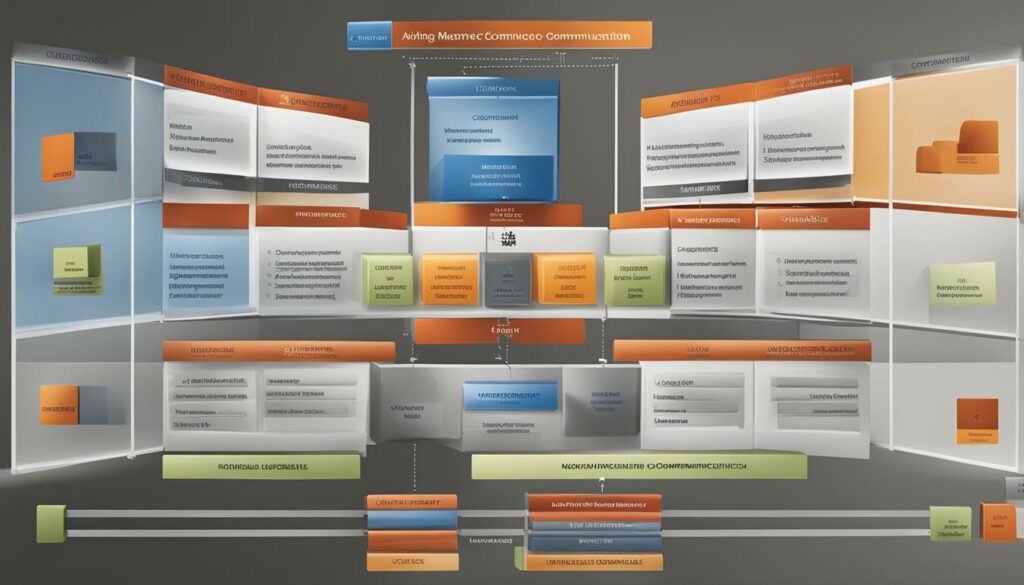Legal and administrative procedures are a vital component of any organization, providing a framework for efficient decision-making and management. These procedures encompass a wide range of processes, documentation, and guidelines that ensure accountability and fairness. Whether it’s dealing with legal paperwork, following administrative guidelines, or understanding the intricacies of legal processes, navigating through these complexities is essential for success.
Key Takeaways:
- Legal and administrative procedures establish efficiency, consistency, responsibility, and accountability within an organization.
- Private organizations rely on administrative procedures to cover functions such as hiring, promotions, and budgeting.
- Public organizations implement administrative procedures to protect citizen rights and provide an avenue for appeal.
- Administrative procedures contribute to transparency, accessibility, and trust in the decision-making process.
- There is a need for a comprehensive regulation on good administration to harmonize procedures and establish minimum requirements.
The Importance of Administrative Procedures
Administrative procedures play a crucial role in organizations, providing a foundation of efficiency, consistency, responsibility, and accountability. By establishing clear rules and guidelines, these procedures ensure that management actions are made in an objective, fair, and consistent manner.
Efficiency is a key benefit of administrative procedures. By providing a standardized framework for decision-making, these procedures streamline processes and save valuable time and resources. With well-defined procedures in place, organizations can avoid the pitfalls of burdensome and convoluted decision-making processes.
Consistency is another vital aspect of administrative procedures. By adhering to established rules and standards, organizations can ensure that similar situations are treated in a similar manner, promoting fairness and objectivity. Consistency also helps build trust among stakeholders, as they can rely on the organization to make decisions in a predictable and consistent way.
“Administrative procedures establish an objective set of rules for governing an organization, ensuring efficiency, consistency, responsibility, and accountability.”
Responsibility and accountability are fundamental principles supported by administrative procedures. These procedures hold managers and decision-makers accountable for their actions and decisions by providing a clear framework for decision-making and documentation. By establishing a system of responsibility and accountability, administrative procedures contribute to a culture of transparency and ethical conduct within the organization.
Overall, administrative procedures are essential for organizations in maintaining order and ensuring the smooth functioning of operations. With their focus on efficiency, consistency, responsibility, and accountability, these procedures provide a strong foundation for effective and ethical decision-making.

Administrative Procedures in Private Organizations
In private organizations, administrative procedures play a crucial role in ensuring effective management and decision-making processes. These procedures are typically outlined in the employee handbook or manual, providing a framework for key management functions such as hiring, firing, promotion, and budgeting. By establishing clear guidelines and rules, administrative procedures ensure consistency and fairness in decision-making.
The employee handbook serves as a reference guide for employees, outlining their rights, responsibilities, and the procedures they must follow. It sets expectations for behavior, dress code, and performance standards, promoting a harmonious and productive work environment. Additionally, administrative procedures govern the hiring process, ensuring that it is fair and transparent, and that qualified candidates are selected for open positions. They also play a vital role in handling employee terminations and promotions, ensuring that these decisions are based on merit and aligned with the organization’s goals and values.
Budgeting is another crucial aspect of administrative procedures in private organizations. By establishing clear processes and guidelines for budget planning and approval, these procedures help ensure financial accountability and responsible resource allocation. They provide a framework for defining budgetary goals, tracking expenses, and making informed financial decisions. By following these procedures, organizations can achieve financial stability and optimize their operational effectiveness.

In conclusion, administrative procedures in private organizations are essential for maintaining efficiency, consistency, and accountability in management functions. Through the employee handbook, these procedures establish clear guidelines and expectations for employees, ensuring a productive work environment. They also govern critical processes such as hiring, firing, promotion, and budgeting, providing transparency and fairness in decision-making. By adhering to these procedures, private organizations can create a strong foundation for success and foster a positive relationship with their employees.
Administrative Procedures in Public Organizations
Government agencies, as public organizations, have their own set of administrative procedures that are designed to ensure fair and lawful decision-making processes. These procedures are essential for maintaining transparency, protecting citizen rights, and providing a mechanism for appeals. Public organizations often operate within a complex regulatory framework, and administrative procedures help navigate through these complexities.
One of the key aspects of administrative procedures in public organizations is the presence of procedural rules. These rules define the step-by-step process that government agencies must follow when making decisions. Procedural rules ensure that decisions are made in accordance with the law and that the rights of citizens are protected. They help establish a clear and consistent framework for decision-making, reducing the likelihood of arbitrary or biased judgments.
Citizen rights are an important consideration in administrative procedures within public organizations. These procedures are designed to provide fair and equal treatment to all individuals interacting with government agencies. They ensure that citizens have access to information, the opportunity to participate in the decision-making process, and the right to appeal adverse decisions. By upholding citizen rights, administrative procedures in public organizations contribute to a more democratic and accountable administrative process.
| Table: Key Aspects of Administrative Procedures in Public Organizations | |
|---|---|
| Procedural Rules | Ensure decisions are made in accordance with the law |
| Citizen Rights | Protect rights and provide avenues for appeals |
| Transparency | Enable citizens to understand the decision-making process |
| Accountability | Hold government agencies responsible for their actions |
Administrative procedures in public organizations serve an important role in ensuring that government actions are carried out transparently, accountably, and in the best interests of citizens. These procedures help maintain the legitimacy of public organizations and build trust between the government and its stakeholders. By adhering to clear and fair administrative procedures, public organizations can foster a more inclusive and participatory decision-making process.
Clear Principles and Standards in Administrative Procedures
Administrative procedures should adhere to clear principles and standards to ensure transparency, accountability, and consistency. By establishing these principles, organizations can foster trust and confidence in their decision-making processes. Transparency is crucial in administrative procedures as it allows stakeholders to understand the reasoning behind decisions and participate in the process. By providing clear communication and public notices, organizations can ensure that all relevant information is shared with stakeholders, promoting transparency and enabling them to make informed decisions.
Accountability is another important aspect of administrative procedures. By establishing clear standards, organizations can hold themselves accountable for their actions. These standards help prevent arbitrary decision-making and ensure that decisions are made in a fair and consistent manner. With accountability, organizations can demonstrate their commitment to responsible decision-making, building trust with stakeholders and enhancing their reputation.
Consistency is also key in administrative procedures. By implementing well-defined procedural standards, organizations can ensure that similar cases are treated in a uniform manner. Consistency promotes fairness and avoids situations where similar cases are decided differently, creating a sense of unfairness or bias. By adhering to consistent procedural standards, organizations can demonstrate their commitment to providing an equal and unbiased process for all stakeholders involved.
The Importance of Clear Principles and Standards
Clear principles and standards in administrative procedures are of utmost importance as they contribute to transparency, accountability, and consistency. Without these principles, organizations may face challenges in gaining trust from stakeholders and ensuring fair decision-making processes. By implementing clear principles and standards, organizations can establish a strong foundation for efficient and effective administrative procedures.
Table: Key Elements of Clear Principles and Standards in Administrative Procedures

| Principles | Standards |
|---|---|
| Transparency | Clear communication, public notices, and reasons for decisions |
| Accountability | Establishing guidelines for responsible decision-making |
| Consistency | Well-defined standards applied uniformly |
Rights and Legal Certainty in Administrative Procedures
One of the key benefits of administrative procedures is the enhanced rights and legal certainty they provide to individuals and businesses. These procedures establish procedural guarantees that ensure fair and consistent decision-making by administrative agencies. By having these guarantees in place, individuals and businesses can have confidence that their rights will be protected throughout the administrative process.
Administrative procedures offer legal certainty by providing a clear framework for decision-making and establishing minimum requirements for administrative processes. This means that individuals and businesses can rely on these procedures to guide their interactions with administrative agencies, knowing that the decisions made are based on fair and consistent principles. Furthermore, administrative procedures are enforceable in courts, providing a recourse for individuals and businesses if their rights are violated.
Administrative procedures play a crucial role in safeguarding the rights of individuals and businesses, ensuring that decision-making processes are fair, transparent, and accountable.
By ensuring rights and legal certainty, administrative procedures contribute to a stronger foundation of trust in the administrative process. When individuals and businesses have confidence that their rights will be protected and that decisions will be made in a fair and consistent manner, they are more likely to engage with the administrative system and participate in the decision-making process. This trust and participation are vital for maintaining a positive relationship between the organization and its stakeholders.
Overall, rights and legal certainty in administrative procedures are essential for creating a transparent and accountable administrative process. These guarantees provide individuals and businesses with confidence that their rights will be protected, and decisions will be made in a fair and consistent manner. By establishing procedural guarantees that are enforceable in courts, administrative procedures contribute to legal certainty and trust in the administrative process.

Efficiency and Cost Savings through Administrative Procedures
Efficient administrative procedures not only save time and resources but also lead to significant cost savings for organizations. By implementing streamlined processes and eliminating burdensome tasks, organizations can optimize their operations and allocate resources more effectively. This ultimately results in improved productivity and financial performance.
One of the key benefits of efficient administrative procedures is the time-saving aspect. When administrative tasks are well-defined and standardized, employees can complete them more quickly and efficiently. This allows them to focus on more value-added activities, such as serving customers or implementing strategic initiatives. Time-saving administrative procedures also reduce the risk of delays and bottlenecks, ensuring that important decisions and actions are carried out in a timely manner.
Moreover, efficient administrative procedures contribute to cost savings by minimizing waste and improving resource allocation. By eliminating redundancies and streamlining processes, organizations can reduce unnecessary expenses and operational inefficiencies. For example, having clear procedures for procurement and budgeting helps organizations optimize their spending, negotiate better terms with suppliers, and avoid unnecessary expenses. Overall, efficient administrative procedures enable organizations to operate more cost-effectively and achieve their financial objectives.

Table: Cost Savings through Efficient Administrative Procedures
Below is a table highlighting the potential cost savings that can be achieved through efficient administrative procedures. It compares the costs associated with traditional, inefficient administrative processes versus streamlined, efficient processes.
| Cost Category | Traditional Administrative Processes | Efficient Administrative Processes | Cost Savings |
|---|---|---|---|
| Processing Time | Significantly longer due to manual and redundant tasks | Shortened through automation and standardization | Reduction in labor costs |
| Resource Allocation | Inefficient due to lack of visibility and coordination | Optimized through streamlined processes and data-driven decision-making | Reduction in wasteful spending |
| Error Rate | Higher due to manual data entry and lack of quality control | Lowered through automation and validation checks | Reduction in rework and associated costs |
As seen in the table, efficient administrative procedures result in significant cost savings across various categories. By leveraging technology, automation, and standardized processes, organizations can minimize errors, reduce processing time, and optimize resource allocation. These cost savings can be reinvested in other areas of the organization, such as research and development, employee development, or customer-centric initiatives.
Building Trust and Legitimacy through Administrative Procedures
An important aspect of administrative procedures is their contribution to building trust and enhancing the legitimacy of the organization. Transparent and accessible administrative procedures instill trust in the decision-making process, as individuals can understand the reasons behind the decisions and have the opportunity to participate in the process. Trust in administrative procedures is crucial for maintaining a positive relationship between the organization and its stakeholders.
Transparency plays a key role in establishing trust. When administrative procedures are conducted openly, stakeholders can have confidence that decisions are made in a fair and unbiased manner. Making information readily available and providing clear explanations of the decision-making process helps to build trust by allowing stakeholders to assess the legitimacy of the decisions that affect them.
Accessibility is another important aspect of trust in administrative procedures. When procedures are accessible to all stakeholders, it promotes inclusivity and ensures that everyone has an equal opportunity to participate and voice their concerns. This helps to enhance the democratic legitimacy of the organization as individuals feel that their voices are heard and their rights are protected.
“Transparency is the key to trust. By making administrative procedures transparent, organizations can build trust and enhance their legitimacy.”
In summary, trust in administrative procedures is built through transparency and accessibility. By promoting transparency, organizations can demonstrate that decisions are being made in a fair and unbiased manner. Accessibility ensures that all stakeholders have an equal opportunity to participate, strengthening the democratic legitimacy of the organization. Building trust and legitimacy through administrative procedures is essential for maintaining positive relationships with stakeholders and upholding the principles of good governance.
| Key Factors | Benefits |
|---|---|
| Transparency | – Builds trust – Demonstrates fairness |
| Accessibility | – Enhances democratic legitimacy – Promotes inclusivity |
The Need for a Regulation on Good Administration
Administrative procedures play a vital role in ensuring efficiency, transparency, and accountability within organizations. To further enhance these principles and provide individuals and businesses with necessary rights and protections, there is a growing need for a comprehensive regulation on good administration. Such a regulation would establish clear and comprehensive rules that apply uniformly to all administrative processes, ensuring procedural guarantees and minimum requirements.
This regulation would bring about several benefits for both organizations and their stakeholders. Firstly, it would harmonize administrative procedures, reducing inconsistencies and promoting fairness and equal treatment for all individuals and businesses. By providing clear guidelines and standards, the regulation would enhance transparency and accessibility, allowing stakeholders to understand and participate in the decision-making process.
Additionally, a regulation on good administration would contribute to legal certainty by establishing enforceable procedural guarantees. This means that individuals and businesses would have the means to protect their rights and seek redress through the court system if necessary. It would provide a solid foundation for building trust and confidence in administrative processes, reinforcing the legitimacy of organizations and fostering positive relationships with stakeholders.
In conclusion, a regulation on good administration is essential in today’s complex business and legal landscape. By setting clear principles, harmonizing procedures, and ensuring procedural guarantees, this regulation would enhance transparency, accountability, and fairness in administrative procedures. It would provide individuals and businesses with the necessary rights and protections, ultimately benefiting organizations and their stakeholders as a whole.
Conclusion
Legal and administrative procedures are of utmost importance in organizations as they navigate through complexities, ensuring efficiency, trust, and compliance with regulations. These procedures establish clear principles and standards, promoting transparency and accountability in decision-making processes.
By implementing well-defined administrative procedures, organizations can streamline their operations, save costs, and reduce the burden of cumbersome processes. Additionally, these procedures contribute to building trust and legitimacy by providing individuals and businesses with legal certainty and procedural guarantees.
However, to enhance the effectiveness of administrative procedures, there is a need for a comprehensive regulation on good administration. This regulation would harmonize procedures, establish minimum requirements, and provide consistent procedural guarantees. Such a regulation would further strengthen the organizational relationship with stakeholders and ensure fairness in administrative processes.
FAQ
What are legal and administrative procedures?
Legal and administrative procedures are a set of rules that govern the management and decision-making processes within an organization. They establish efficiency, consistency, responsibility, and accountability.
Why are administrative procedures important?
Administrative procedures are important because they ensure fair and objective decision-making, establish a standardized framework for decision-making, hold managers accountable for their decisions, and contribute to efficiency, consistency, responsibility, and accountability within an organization.
How are administrative procedures implemented in private organizations?
In private organizations, administrative procedures are implemented as a set of rules for making decisions regarding key management functions. These procedures are usually outlined in the employee handbook or manual and cover topics such as vacation time, dress code, grievance procedures, hiring, firing, promotions, and budgeting decisions.
How are administrative procedures implemented in public organizations?
In public organizations, administrative procedures include rules and regulations that protect citizen rights and provide an avenue for appeal. Government agencies often have procedural rules that govern interactions with the public and provide a right to appeal adverse decisions.
What should be the principles and standards of administrative procedures?
Administrative procedures should have clear principles and standards to ensure transparency, accountability, and consistency. These may include public announcements of processing times, prior notices, opinion hearings, and presenting reasons for decisions. Procedural standards should be well-defined and applied uniformly to ensure fairness and avoid arbitrary decision-making.
How do administrative procedures contribute to legal certainty?
Administrative procedures provide individuals and businesses with procedural guarantees, ensuring that decisions made by administrative agencies are fair and consistent. These guarantees are enforceable in courts, providing the means to protect rights and seek redress if these rights are violated.
How do administrative procedures contribute to efficiency and cost savings?
By establishing clear processes and standards, administrative procedures save time and reduce the burden of decision-making processes. They also ensure that decisions are made in a timely manner, avoiding delays and inefficiencies. Overall, efficient administrative procedures lead to cost savings and a more effective organization.
How do administrative procedures build trust and enhance legitimacy?
Transparent and accessible administrative procedures instill trust in the decision-making process, as individuals can understand the reasons behind the decisions and have the opportunity to participate. This transparency enhances the democratic legitimacy of the organization, as citizens feel their voices are heard and their rights are protected.
Why is there a need for a regulation on good administration?
A regulation on good administration would provide clear principles, well-defined standards, and procedural guarantees that apply uniformly to all administrative processes within an organization. It would establish minimum requirements, ensuring individuals and businesses have the necessary rights and protections when dealing with administrative agencies, leading to better outcomes for both the organization and its stakeholders.
Source Links
- https://legal.seoul.go.kr/legal/english/front/page/contents.html?pAct=administrativeProcedures
- https://study.com/academy/lesson/what-are-administrative-procedures-definition-lesson-quiz.html
- https://www.europarl.europa.eu/meetdocs/2009_2014/documents/juri/dv/eav_lawofadminprocedure_/EAV_LawofAdminprocedure_EN.pdf

